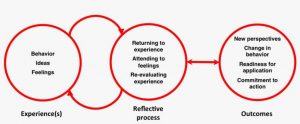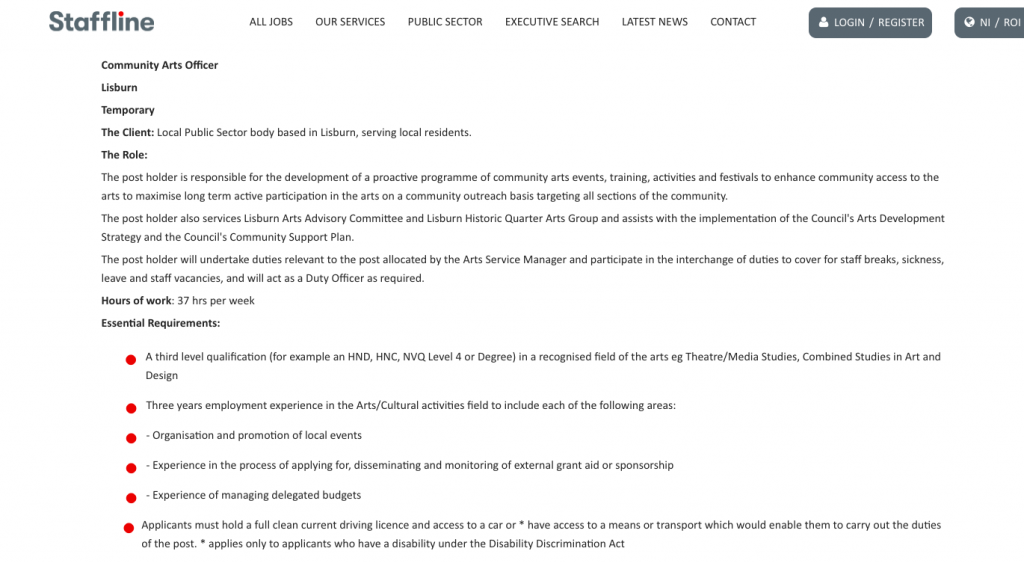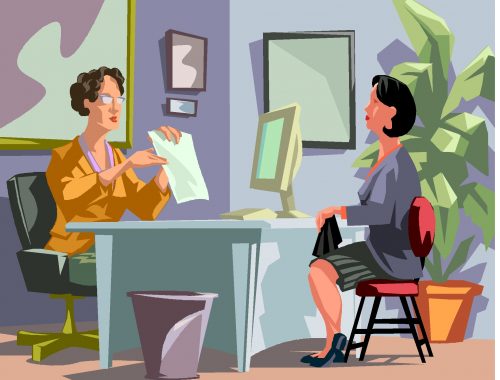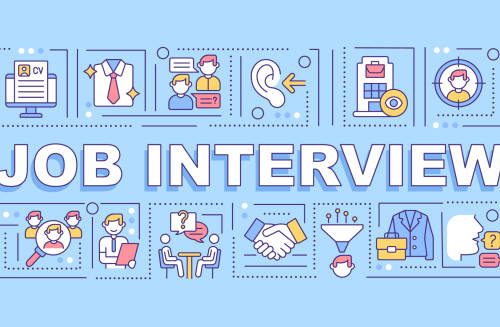‘Interview’ : [noun] the terrifying gateway to post-graduation employment
There’s something about the word interview that immediately sends a shock of panic into a person. Although I have had a few interviews in my life, the prospect of having one, particularly for an entry-level position, a post-graduation job, was a bit daunting to say the least. How do I prepare? What could I be asked? How can I best present myself? These are all questions that I have asked myself in my final year, and as much as I reflected on previous experiences, my fears were still present. This all changed as a result of the simulated interviews.
Now that I have completed the simulated interview, I am going to use this opportunity to reflect on my experience in order to identify my strengths and areas for development for future interviews. I will be doing this through using Boud’s method of reflection.

But the interview was not the first hurdle…
The first task that I had to complete was actually a job search, a task that I honestly underestimated. I got to witness first-hand exactly what jobs are currently available in the theatre industry, and this made me think a lot more into what direction I wanted my career to go in. Although initially I went into this experience searching for a teaching post, I saw a listing for the Island Arts Centre’s Community Arts Officer post. This intrigued me, despite it not being what I was originally looking for. When reading the description, I found that they were looking for someone with a skillset and experiences similar to my own. I also noted that the responsibilities included tasks familiar to me through projects that I have previously taken part in, and really enjoyed and thrived in. This has taught me the transferability of skills, and encouraged me to look further into options beyond initial plans, as you may find an opportunity that you never expected.

(Hebert-Maccaro and Bell, 2022)
“Preparation is the key to success”
Initially, I felt nervous about preparing and completing the interview. Even though there were no stakes attached, it still felt quite real, and I wanted to perform well. I decided to research the best ways to prepare for an interview, and found the Prospects website’s section on ‘How to prepare for an interview’ very useful (Swain, 2021).
The main takeaways that I got were to…
1 – Research the company and the employer!
2 – Fully understand the responsibilities of the role, and be prepared to give examples of why you would be capable of these responsibilities.
3 – Practice with a variety of questions.
Following these steps produced a positive outcome in my performance in the simulated interview. My research on the company allowed me to see what the centre’s aims and typical events entailed. For example, I found that they had a focus on ‘a sense of wellbeing […] wider community and schools […] workshops, funding and training opportunities’ (Island Community Arts Centre Website), demonstrating to me that these are values that are held in high regard to this centre. I made sure to mention these things and my experiences that were relevant to them in my interview, which actually included my placement, and it was noted on my feedback form that I had a ‘great, in-depth knowledge of the company’ and also a ‘strong understanding of the role’. It was also noted how I was able to relate back these requirements to relevant experience that I had, demonstrating my capabilities, so this is definitely an approach that I would take again in future.
An impression begins the moment you walk into a room.
This is something that I was very aware of when getting dressed for the interview. Research on how best to present myself had shown me that smart casual was the best dress code for interviews, unless specified otherwise. This is also the dress code for my placement, so I was able to choose an appropriate outfit. My physical presentation of myself was also commended in my feedback, both in terms of dress and also in holding myself with confidence, which I did with maintaining eye contact and visually reacting to their questions and comments. I believe that this was only possible due to the amount of preparation that I had undertaken, but as a result I have learned the ripple effect that this preparation can have in how I am presented to an employer.

But there is always room for improvement…
I got very encouraging feedback from my simulated interview. However, there were areas for improvement identified, which I am working on developing throughout the rest of my time at university before entering employment. One of the main points highlighted was that I spoke too quickly, which disrupted my clarity and made me harder to follow at times. Upon recognising this, I decided to search for some techniques to slow down my speech when I’m anxious, which I found online (Diresta). I will aim to practice these so that when it comes to an actual interview, I will be have improved this, and hence will not cause issues in a proper interview in future, and I will be much more clear and concise.
‘Simulation is a powerful educational tool to help facilitate learning.’
(Zigamont et al., 2011)
Zigamont’s argument is one that has definitely proved true for me throughout this experience. By simulating an interview experience, I had to carry out all of the steps that I will have to when applying to an entry-level position, but without the same pressure. The simulation has allowed me to begin to fine-tune my interviewing technique, a skill that will serve me well in a post-graduation workplace. And I have to say, after this experience…suddenly… the word interview… it does not send quite as much of a shock of panic into me anymore.
By Chloe Patterson
Word Count : 997 words
Bibliography
Boud, David, “Reflection Cycle – Boud Reflective Model 1985 PNG Image: Transparent PNG Free Download on Seekpng.” SeekPNG.com, https://www.seekpng.com/ipng/u2q8u2o0y3i1w7i1_reflection-cycle-by-david-boud-boud-reflective-model/.
“Community Arts & Education.” Community Arts & Education | ISLAND Arts Centre, Island Community Arts Centre, https://islandartscentre.com/community-arts-education/.
Diresta, Diane. “Six Sloppy Speech Habits.” CMS-Next POC, Monster, https://www.monster.com/career-advice/article/six-sloppy-speech-habits.
Hebert-Maccaro, Karen Hebert-Maccaro, and Alexander Graham Bell. “Preparation Is the Key to Success.” Morning Brew, Morning Brew, 27 Sept. 2022, https://www.morningbrew.com/sidekick/stories/preparation-skill-for-success.
Island Community Arts Centre. “Apply for Community Arts Officer .” Apply for Community Arts Officer via Staffline , ·Staffline, https://www.staffline.ie/job/community-arts-officer?source=google.com.
Swain, Rachel. “How to Prepare for an Interview.” Prospects.ac.uk, Prospects , May 2021, https://www.prospects.ac.uk/careers-advice/interview-tips/how-to-prepare-for-an-interview.
Zigamont, Jason J., et al. “Theoretical Foundations of Learning Through Simulation.” ScienceDirect, 25 Mar. 2011, https://www.sciencedirect.com/science/article/pii/S0146000511000036.
You May Also Like

Interview a New You! – Becoming an Interview Guru
24 February 2023
BE A S.T.A.R 🌟
14 February 2023
